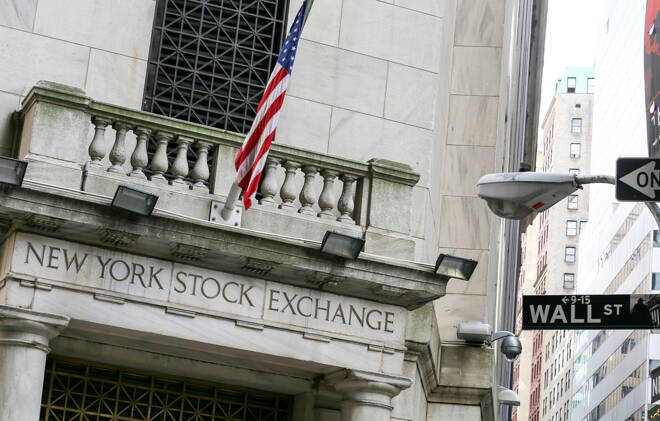Advertisement
Advertisement
Goldman Sachs Q3 Net Revenue Jumps 30% to 10.78 Billion; Target Price $326 in Best Case
By:
Goldman Sachs Group Inc, an American multinational investment bank, reported a better-than-expected profit and revenue in the third quarter as businesses recovered from the COVID-19 pandemic after a sharp decrease in the second quarter, sending its shares up about 3% in pre-market trading on Wednesday.
Goldman Sachs Group Inc, an American multinational investment bank, reported a better-than-expected profit and revenue in the third quarter as businesses recovered from the COVID-19 pandemic after a sharp decrease in the second quarter, sending its shares up about 3% in pre-market trading on Wednesday.
The Wall Street trading powerhouse reported that its net revenue jumped 30% to $10.78 billion, beating market estimates of $9.5 billion, and net earnings of $3.62 billion for the third quarter which ended on Sept 30. Net revenues were $32.82 billion and net earnings were $5.20 billion for the first nine months of 2020, the company said.
Diluted earnings per common share (EPS) was $9.68 for the third quarter of 2020, doubled than the market consensus of $5.57 per share, compared with $4.79 for the third quarter of 2019 and $0.53 for the second quarter of 2020, and was $13.34 for the first nine months of 2020 compared with $16.32 for the first nine months of 2019.
Goldman Sachs said its annualized return on average common shareholders’ equity (ROE) was 17.5% for the third quarter of 2020 and 8.0% for the first nine months of 2020. Annualized return on average tangible common shareholders’ equity was 18.6% for the third quarter of 2020 and 8.5% for the first nine months of 2020.
At the time of writing, Goldman Sachs’ shares traded 0.79% higher at $212.48 on Wednesday; however, the stock is down about 8% so far this year.
Executive comments
“Our ability to serve clients who are navigating a very uncertain environment drove strong performance across the franchise, building off a strong first half of the year. As our clients begin to emerge from the tough economy brought on by the pandemic, we are well-positioned to help them recover and grow, particularly given market share gains we’ve achieved this year,” said David M. Solomon, Chairman and Chief Executive Officer.
Goldman Sachs stock forecast
Fifteen analysts forecast the average price in 12 months at $250.64 with a high forecast of $326.00 and a low forecast of $200.00. The average price target represents an 18.01% increase from the last price of $212.38. From those 15 equity analysts, ten rated “Buy”, five rated “Hold” and none rated “Sell”, according to Tipranks.
Morgan Stanley target price is $208 with a high of $295 under a bull scenario and $119 under the worst-case scenario. Goldman Sachs stock prices were raised by JMP Securities to $280 from $275 and BofA Global Research upped their price objective to $246 from $240.
Other equity analysts also recently updated their stock outlook. Deutsche Bank raised the price target to $230 from $227 and UBS increased their stock rating to buy from neutral, raising the target price to $245 from $220.
Analyst Comments
“We expect a strong finish to 2020, with 2H20 revenues up 9% y/y as stronger capital markets drive an earnings beat in 3Q, and the uncertainty/volatility around the election drive a strong backdrop for 4Q. That said, we remain Equal-Weight GS with a one-year time horizon as market volatility and the urgency around capital raising activity (both equity and debt) subside in 2021. We expect total revenues decline 9% y/y in 2021, driven by weaker trading revenues,” said Betsy Graseck, equity analyst at Morgan Stanley.
“Stock is trading at 0.8x 2021 BVPS, reflecting the 9-10% ROE we expect in 2021/2022. Over time, we expect GS can drive some multiple expansion as management executes on its multi-year strategic shift towards higher recurring revenues,” Graseck added.
Upside and Downside Risks
Upside: 1) Quick and sustained economic / capital markets rebound. 2) Strong trading environment and market share gains. 3) Strategic changes drive revenue/EPS growth sooner than expected. 4) Faster expense reduction. 5) 1MDB issue resolved quickly – highlighted Morgan Stanley.
Downside: 1) Markets decline sharply and IBD activity stalls through 2021. 2) Higher loan losses in consumer loan books. Energy prices decline further. 3) Strategic changes take longer to execute.
Check out FX Empire’s earnings calendar
About the Author
Vivek Kumarauthor
Vivek completed his education from the University of Mumbai in Economics and possesses stronghold in writing on stocks, commodities, foreign exchange, and bonds.
Advertisement
